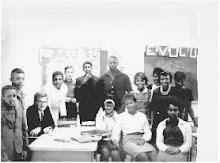Enabling Questions (EQ) For Active Student-Centered Inquiry & Verbal Learning*
EQs are interrupting questions that stir creative outcomes
•
*Abridged with author permission: Manzo/Manzo/Thomas (2009) Content Area Literacy: A Framework for Reading-Based Instruction (5th edition) Wiley Publishers
The Enabling Questions (EQ) procedure is a student-centered gambit designed to provide experience and Self-Instruction for students in the value and empowerment that comes from learning how to use various inquiry strategies in conventional verbal learning (Manzo/Manzo, 1990). EQ is initiated and demonstrated in a highly structured way with a prepared set of questions that students can be used to tune into and reduce distraction during Lecture-Discussion, still the most frequently used form of instruction. Using Enabling Questions puts the listener into an active, engaged thinking mode and invites the teacher or speaker to talk a little less and a little more pointedly in response student-relevant questions and concerns. Students should be urged to translate the model questions ahead into their own words and to practice using these each day and in each class. EQ is a powerful social tool that illustrates how to be assertive without being rude or aggressive. It can be a very inviting substitution for maladaptive behavior in disruptive classrooms. Disruptive students will use these questions rather disruptively. The teacher would be wise to focus on the questions raised and in so doing illustrate to students the value and reasonable control that they can exercise over a lesson. The inversion of student-centered questions for teacher-centered questions seems to be its own reward. The sum of student comments suggests that this kind of give and take makes them feel like they are part of something constructive.
Suggested Enabling Question Types
Set 1: Questions that Help the Listener Organize and Clarify Information
• What is/are the main question(s) you are answering by your lecture (or lesson) today?
• Which key terms and concepts are most important for us to remember from what you have said (or will say) today?
• What is most often misunderstood or confusing about the information or position you are presenting today?
Set 2: Questions that Help the Listener Get a Mental Breather
• Could you please restate that last point in some other words?
• Would you please spell ____ and ____ for us?
• Would you please say which points you especially want us to note at
this time?
Set 3: Questions that Invite Give-and-Take with the Speaker
• How does what you have said compare with positions others have taken, and who might these others be?
• Is there convincing evidence to support your position that you can share with us?
• What do you think is the weakest part of the position you have taken?
• How do you think this position (or new information) affects previously held beliefs?
• What do you suppose would happen if you extended this point another step or two?
• Would you mind pausing for a moment to see if there are other views on this in the class/audience? This would help us better understand and follow your points.
Any one of the latter sets of questions likely would put the listener back into an active and engaged thinking mode and reduce the sometimes excessive dominance of the speaker. It is important that the listener who wishes to use these types of questions does so with an eye toward using them for enriching comprehension, learning, and mature interaction, and not as a counteroffensive. One way to help students learn the value and become regular users of Enabling Questions is to write these questions on index cards and distribute a few to each class member. Then urge students to try to use the questions on their card(s) intelligently over a two- to three-day period. Schedule a day to discuss what happened and what students learned and what might need to be modified to make the Enabling Questions even more enabling. This “metacognitive”- or thinking about thinking - step also helps to convert rather rigid Inquiry skill training into self-directed flexible Inquiry Strategy Learning.
To see more teaching methods for Professional Teachers, and advancing Professional Education go to: http://teacherprofessoraccountability.ning.com/main/invitation/new?xg_source=msg_wel_network And…http://bestmethodsofinstruction.com/ Or our newest site for Professional Teachers: http://anthony-manzo.blogspot.com/2010/05/race-to-top-accountability-leaves.html
Subscribe to:
Post Comments (Atom)

Hello,
ReplyDeleteI found your blog very awesome its greatest one.Thank you very much for sharing such a nice article its very informative for me.
custom essay papers writing service
Really awesome!! Love it!i was searching for something like that. Such a good one. thanks a lot for sharing.
ReplyDelete